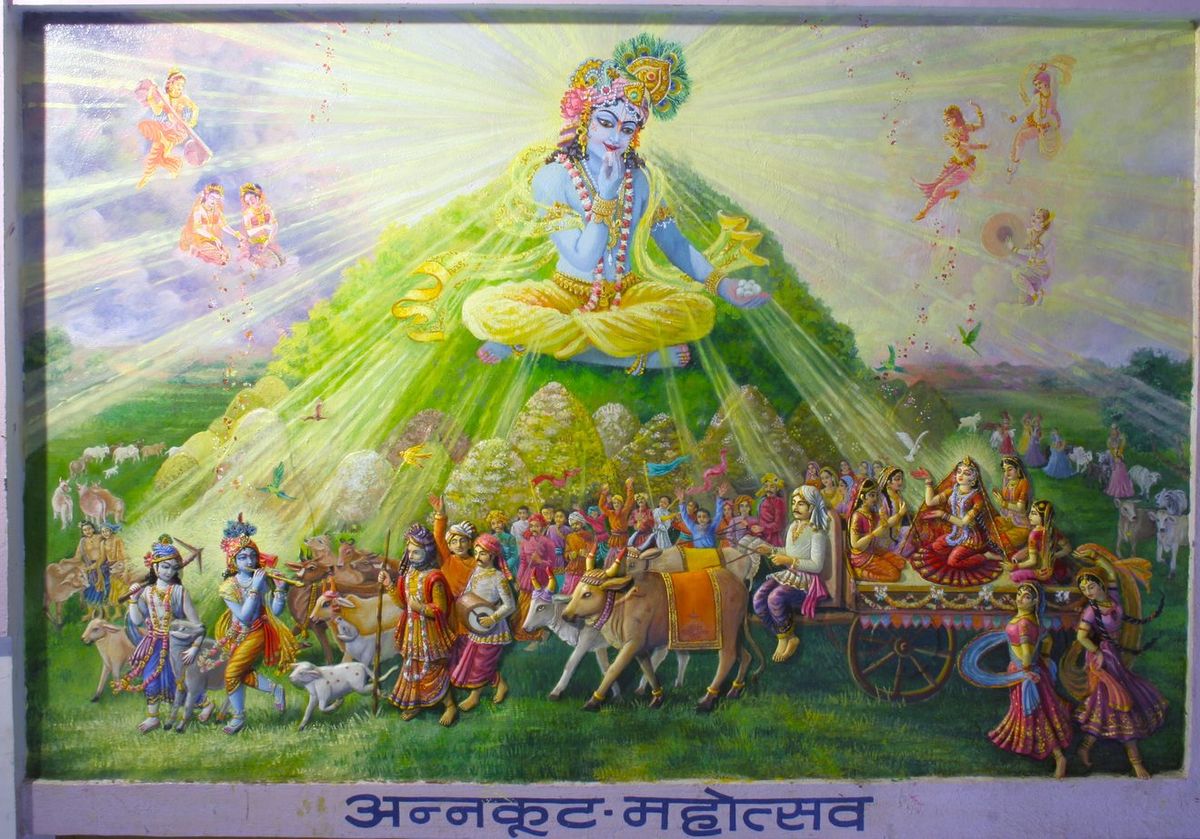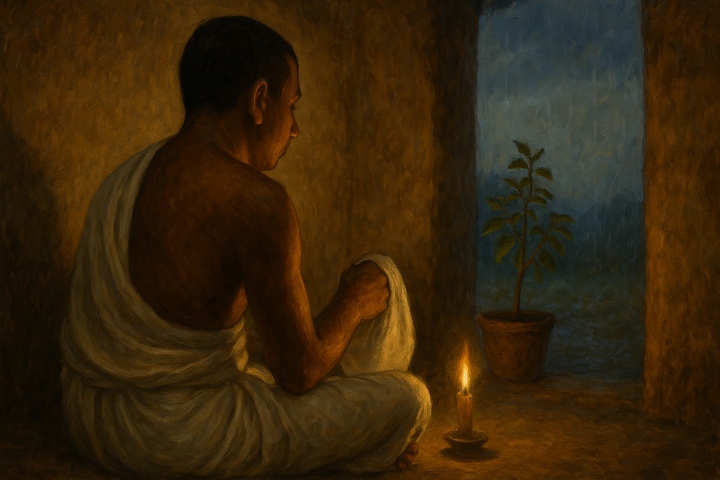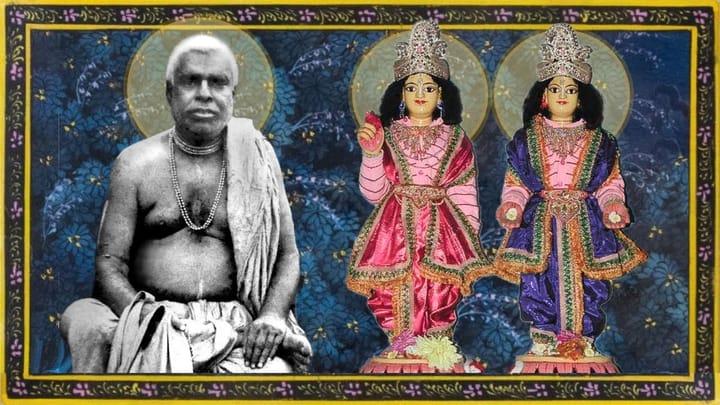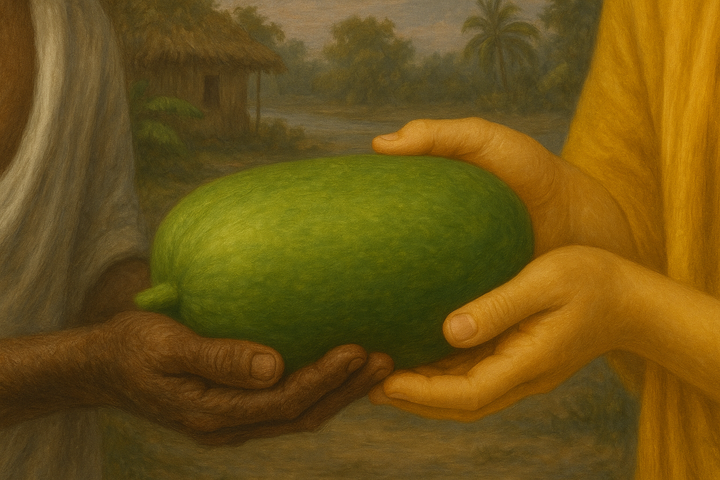The Esoteric Meaning of Annakūṭa

Śrī Girirāja Mahārāja ki jaya!
Govardhana-dharana ki jaya!
Giridhāri Śrī Kṛṣṇacandra ki jaya!
Tomorrow marks the joyful celebration of Annakūṭa-mahotsava. To honor this day, I'm sharing below a brief discourse by our Paramgurudeva, Śrī Śrīmad Bhakti Prajñāna Keśava Gosvāmī Mahārāja. He delivered it on October 22, 1949, during the Annakūṭa-mahotsava while observing Kārtika-vrata with his god-brothers and disciples in Ayodhyā.
If you'd like to listen to it being read out, here's a recording of our reading from last year, though the internet connection was a bit shaky. I'll be re-reading it tomorrow morning at 7 AM India time on my personal YouTube channel, this time with a more stable connection.
The Esoteric Meaning of Annakūṭa
by Śrī Śrīmad Bhakti Prajñāna Keśava Gosvāmī Mahārāja
There is a mantra in the Śruti that proclaims:
annam vai brahma
“Food grain (anna) is identical to the supreme transcendental entity (brahma-vastu).”
One must realize the meaning of Śruti through vidvat-rūḍhi-vṛtti*, a profoundly learned understanding of its direct meaning.
___
* The meaning of rūḍhi-vṛtti is “direct or primary meaning”. When this term is further qualified by the adjective vidvad (learned) it becomes “the esoteric direct meaning”.
If we assume that this mantra simply indicates the superficial meaning of the word anna – food grain – it will only intensify our tendency to enjoy this world and maintain our aversion to Kṛṣṇa, which is typical of conditioned souls like us. The food grain (anna) that is born of material nature can never be referred to as transcendental substance (brahma). Yet the foodstuffs that are offered to Śrī Hari are “brahma-vat-nirvikāram hi yathā viṣṇu-stathaiva tat – like brahma, devoid of any transformation; they are directly Śrī Viṣṇu Himself.”
The transcendental entity is certainly brahma, and in its form as sound vibration (śabda) it is received through the ears. For this reason it is known as śabda-brahma. Similarly, in the term anna-brahma from the above mantra, anna (food grain) can only truly mean hari-kathā, for only hari-kathā provides the soul with spiritual satisfaction and nourishment, dispelling the soul’s hunger. If we accept transcendental anna, or hari-kathā, our soul will be enlivened as it blossoms into full maturity. This alone is the direct prasāda, or mercy, of Bhagavān. We can make it our aim to accept hari-kathā as our true bhagavat-prasāda.
This anna in the form of hari-kathā is certainly the Transcendental Entity (brahma), because hari-kathā is directly Śrī Hari. The perfect philosophical conclusions of the Vedic scriptures confirm that the meaning of the word brahma exclusively refers to Lord Viṣṇu. The mahājanas of previous times, along with our guru-varga, cause the jubilation of Śrī Śrī Rādhā-Govinda’s senses (go) to swell (vardhana) in ever-novel ways by making an anna-kūṭa, or mountain of anna in the form of hari-kathā. They have worshipped Śrī Śrī Rādhā-Govinda in this way. Today on the auspicious day of Śrī Govardhana-pūjā and the Annakūṭa-mahotsava, our sole activity is to glorify Śrī Śrī Rādhā-Govinda.
Śrī Govardhana is the best of Śrī Hari’s servants, hari-dāsa-varya. Although Govardhana is āśraya-vigraha, the abode of love for Kṛṣṇa, devotees see him as viṣaya-vigraha, the object of that love, or Kṛṣṇa Himself. The gaṇḍakī-śilā, or śālagrāma-śilā, is directly worshipped as Śrī Nārāyaṇa. In the same way, the govardhana-śilā is worshipped as Kṛṣṇa Himself. Govardhana-dhārī (Śrī Kṛṣṇa, the lifter of Govardhana mountain) and Govardhana, are one and the same entity. Yet, that unmatched intense greed to please Kṛṣṇa’s senses (go) known as kṛṣṇa-kāma or kṛṣṇa-prīti, which forever swells (vardhana) to new heights, is indeed Govardhana.
Instead of performing the worship of demigods like Indra or of demigoddesses, we must worship Govardhana in every way. These are truly the teachings of Śrīmad-Bhāgavatam.
Translated from Śrī Gauḍīya Patrikā
Year 1, Issue 10, 1949
CC-BY-SA Rays of The Harmonist
No.19 (Gaura Purnima 2009)



Comments ()